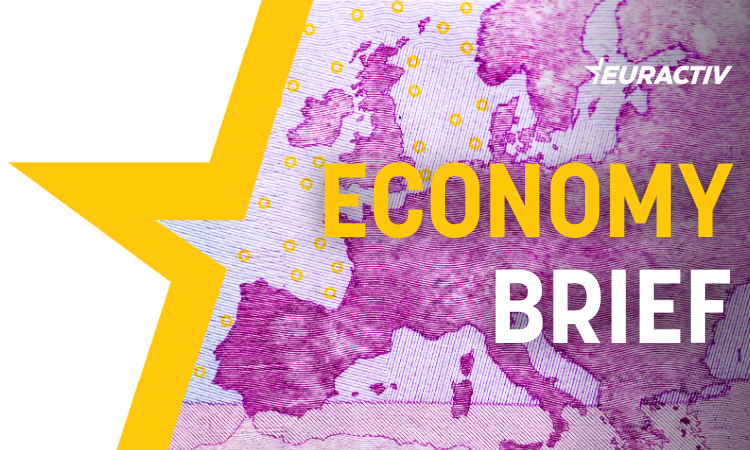
Welcome to EURACTIV’s weekly Economy Brief. You can subscribe to the newsletter here.
If her State of the Union speech is anything to go by, the competitiveness of European industry is Commission President Ursula von der Leyen’s main worry for the coming months – but where this competitiveness should come from is quite unclear.
Whenever political leaders start using the word “competitiveness” significantly more frequently than normal, citizens should be wary.
It’s a bit like your boss walking into the office with a slick-looking consultant, waxing on about the potential of finding synergies and working more efficiently. Often, the result is fewer employees having to do longer hours in a more stressful environment.
No wonder that the European Trade Union Confederation (ETUC) criticised what it called an “SME deregulation drive with a competitiveness check by an opaque board”, which was what was announced – though of course, in different words – by the Commission president.
But other than saying “competitiveness” seven times during her State of the Union speech, did von der Leyen announce anything that could materially benefit European businesses?
Four things are worth mentioning.
1. SMEs
After the European Commission unveiled its late payments regulation and a simplified cross-border taxation system for SMEs on Tuesday, the Commission president on Wednesday said that she would appoint an “SME envoy”, reporting directly to her, and that the Commission would in October present legislative proposals to reduce reporting requirements at the European level by 25%.
The “SME envoy” sounds very similar to the “Stoiber Group on administrative burdens in EU law” that was put in place by the Barroso Commission and chaired by the conservative Bavarian politician Edmund Stoiber from 2007 to 2014. His work was then supposed to continue under Frans Timmermans who was responsible for “Better Regulation” in the Juncker cabinet.
The fact that now an SME envoy appears to be necessary speaks to the limited success of the previous initiatives. Don’t hold your breath for the next iteration.
Meanwhile, it is hard to see the legislative proposal to cut reporting requirements across the board not becoming a complex legislative nightmare, as such reporting requirements typically span across a variety of different EU rules that all have their stakeholders.
2. Battling Chinese electric vehicle (EV) subsidies
The most relevant announcement in von der Leyen’s speech was that the EU was launching an investigation into Chinese EV subsidies that allow Chinese brands to undercut European producers.
If you are interested in the details of the decision, Euractiv has reported on the announcement, on how this investigation will work, and how German and French economy ministers reacted.
Generally, the move can be seen another sign of how the Commission is feeling forced to protect the EU’s commercial interests in a seemingly ever-more-protectionist environment.
In terms of competitiveness, however, this is clearly a defensive move. The aim is not to increase the competitiveness of European producers, but to reduce the competitiveness of Chinese ones.
3. What unites regulatory burden and trade disputes
In theory, the EU could react differently to the Chinese competition, for example by also subsidising electric vehicle producers. From the point of view of a person who would prefer living on a non-boiling planet, a subsidy race for electric vehicles would seem preferable to a battle of tariffs that will make climate saving technologies less affordable.
Alas, the EU cannot really do subsidies, as the member states do not provide it with the necessary fiscal firepower and allowing subsidies on the national level would lead to a fierce intra-European battle.
It is for the exact same reason that companies keep complaining about regulatory burden, although few realise it and even fewer would admit it.
Because the EU cannot achieve its policy goals by spending money, it has to regulate its way there (as I wrote in this Economy Brief before), thus inevitably making the process more burdensome for companies.
4. Mario Draghi – a new hope?
Ursula von der Leyen’s speech does not promise any further European funding, but there is a glimmer of hope in her asking Mario Draghi to write up a report on the future of European competitiveness.
“Because Europe will do ‘whatever it takes’ to keep its competitive edge,” the Commission president said.
Really? Whatever it takes? If you read Mario Draghi’s most recent Economist op-ed or listen to his Feldstein Lecture from 11 July, it is clear that stronger fiscal integration is at the top of his mind.
If Europe is to make the necessary investments into the green transition and its defence, it will have to reform and move much more fiscal firepower to the EU level, Draghi argued in the lecture and in the op-ed.
It’s only a report, which comes with no formal power. But if it is published at a good time next summer, it could influence the new Commission’s work programme. And if the new Commission president is the old Commission president, we will see whether she will truly do “whatever it takes”.
While von der Leyen mentioned “competitiveness” seven times in her State of the Union speech, there was no mention of the “Single Market”. Neither did she mention the “level playing field”, another core EU principle.
Those concepts would have warranted some discussion though, as they were under severe pressure from the national subsidy splurge that was enabled through the loosening of state aid rules.
In the chart below, you see the most recent figures on how much state aid the Commission has approved per member state.
Similarly to the picture from earlier this year, Germany dominates the subsidy race, followed at a distance by France. Even further behind is Italy and then the rest of the member states.
If you want to know more about what this means for the Single Market, do read Théo Bourgery-Gonse’s analysis.
You can find all previous editions of the Economy Brief Chart of the week here.
BEFIT: EU Commission wants to lower tax compliance costs for multinationals. On Tuesday (12 September), the EU Commission put forward a proposal for large companies with a turnover of €750 million or more and operating in multiple member states to introduce a single set of rules to calculate their tax base. Read more.
EU Parliament fixes negotiating position on Single Market Emergency Instrument (SMEI). The Parliament wants the regulation, proposed by the Commission last year to secure critical supply chains and avoid shortages, to be renamed “Internal Market Emergency and Resilience Act” (IMERA). In contrast to the EU Council’s position, the European Parliament would like the SMEI/IMERA to allow the Commission to issue priority-rated orders to companies in times of emergency.
EIB presidency race: Vestager open to EU financing of nuclear and defence. As the race for the European Investment Bank (EIB) presidency reaches the final stretch, Danish candidate Margrethe Vestager said she would be ready to consider EIB financing for defence and nuclear. Both issues are at the heart of her fight against fellow candidate and Spanish Vice-Prime Minister Nadia Calviño – as France made clear its support would go towards a candidate open to providing more EU-level financing to the nuclear sector.
EU countries still divided over proposed corporate accountability rules: Several EU member states have yet to decide on their position on some key aspects of the EU’s draft law to hold companies accountable for human rights and environmental violations throughout their value chain, slowing down the ongoing negotiations on the file. According to a source familiar with the negotiations, an agreement will not be concluded under the Spanish Presidency of the Council, while the European Parliament hopes to reach a deal by February 2024.
Italy to receive third recovery funds payment in October: On 11 September, the EU Economic and Financial Committee gave the final approval for the payment of €18.5 billion under the third instalment of Italy’s recovery funds, which are likely to be disbursed at the beginning of October. Italy’s recovery plan is undergoing a revision with deep implications for both the country’s economy and the EU fiscal integration.
Europol warns of EU criminal networks’ use of money laundering. According to a new Europol report, around 70% of criminal networks in the EU use money laundering to fund their activities, while 80% hide under legal business structures, even though those at the top of the food chain are often based outside of the EU. The report recommends asset recovery as one of the most effective responses because it reclaims “ill-gotten” goods and prevents reinvestment.
French energy moguls commit to capping fuel prices. Fuel prices are on the up again in France, nearing €2/litre. The government, adamant to avoid last year’s energy hikes that had caused blockades and demonstrations across the country, made a plea to energy companies to keep prices in check on Tuesday (12 September). French energy mogul Total announced prices would be capped at €1,99/litre, while food distribution players Intermarché and Super U agreed to sell at cost prices.
European Parliament wants to decriminalise sex work. The European Parliament called on member states to decriminalise people in prostitution and reduce demand, in a report that had sparked a confrontation between sex workers, activists and EU lawmakers over how to regulate sex work. The report, which has no directive legislative effect, was adopted with 234 votes in favour, 175 against and 122 abstentions. During the vote, EU lawmakers scrapped from the text calls on member states to adopt the regulatory approach known as the Nordic model, which criminalises the purchase of sex.
EU Parliament gives final stamp of approval on consumer debt. On 13 September, EU lawmakers voted in favour of a directive aimed at ensuring consumers are able to meet their obligations, in a bid to prevent irresponsible lending practices and over-indebtedness. Under the new rules, creditors (excluding banks, micro-enterprises and SMEs) will go through an admission process and be supervised to ensure decent practices.
Indispensable leverage: How the EU can build its technological edge
Europe’s richest: the top three richest persons in 40 European countries
Global lessons from the demise of Credit Suisse
Additional reporting by Silvia Ellena, Abigail Lee, Théo Bourgery-Gonse.
[Edited by Nathalie Weatherald]







